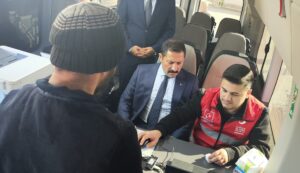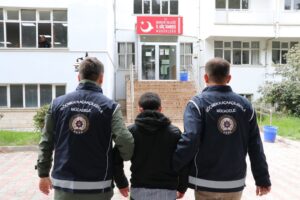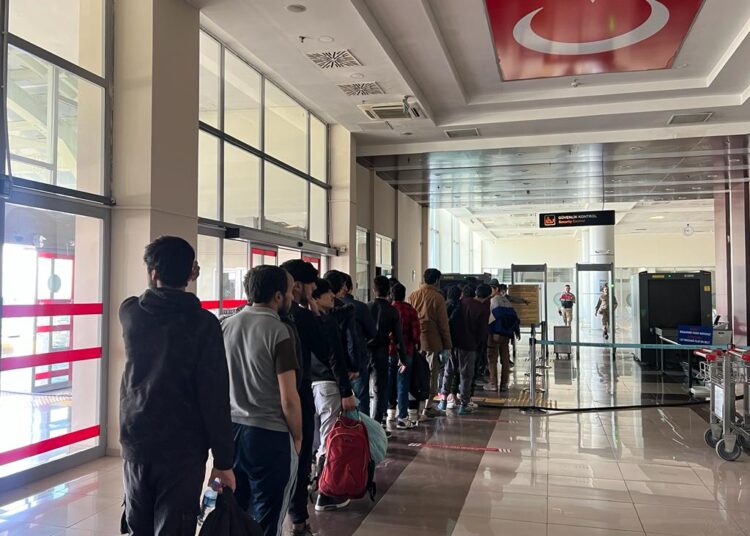Abdullah Bozkurt/Stockholm
Turkey has permitted foreign terrorist fighters (FTFs) to travel to their countries of choice or to the countries where they hold citizenship or residency rather than prosecuting them and holding them accountable for their alleged past crimes.
According to a policy approved in 2018 by President Recep Tayyip Erdogan, the Migration Management Authority (Göç İdaresi Başkanlığınca), which is part of the Interior Ministry, was mandated to remove FTFs from Turkish territory, either forcibly or with their acquiescence.
The policy, still in effect today, has facilitated the movement of thousands of FTFs out of Turkey, particularly to Syria and Iraq. This has allowed them to join their jihadist counterparts in terrorist groups such as al-Qaeda and the Islamic State in Iraq and Syria (ISIS), along with their affiliate and splinter groups.
Although the government has not openly announced the details of the policy regarding FTFs, a growing body of evidence has emerged over the years, illustrating how the Erdogan administration enforces this policy.
The policy is implemented once an individual is flagged as an FTF by Turkish authorities, primarily based on classified intelligence reports. If the person has not committed any crimes in Turkey or does not face any pending administrative, financial or judicial penalties, they are put in repatriation or removal centers (Geri Gönderme Merkezi, GGM in Turkish) managed by the migration agency’s civilian personnel.
The individual is held with irregular migrants who are also undergoing removal procedures. They are not guarded by law enforcement agencies; instead, a few guards employed by private security companies that have contracts with the migration agency provide security. Neither the security guards nor the civilian administrators and staff members of the migration agency have expertise in handling battle-hardened fighters.
Once all arrangements and preparations are finalized, FTFs are transported to borders for deportation. In some cases Turkish authorities simply push them beyond Turkish borders into the territories of neighboring countries, particularly Syria, Iraq, Iran and Greece, without notifying those countries.
In one of the rarely publicized cases, which took place in November 2019, Turkey deported a US national FTF to Greece. However, Greek authorities refused him entry, leaving him stranded in a no man’s land or buffer zone at the Pazarkule-Kastanies border crossing between Turkey and Greece.
The man, an American of Jordanian origin, whose name was partially disclosed as Muhammed Darwis B. (39), is reportedly an ISIS member. He was deported to Greece by the migration agency after he declared that he wanted to go to Greece instead of the US or Jordan.

When asked to comment on this case while the deportee was still in the buffer zone, Erdogan said on November 12, 2019, “Whether they [FTFs] are stuck at the border or not, it doesn’t concern us much anymore. We will continue to send them. Whether they accept them or not is not our concern.”
He warned Turkey’s Western allies, stating, “The doors will open, ISIS members will come to you, don’t try to intimidate us.” He added that Turkey has additional plans to execute when the time comes.
Muhammed Darwis B. was eventually flown to the US by Turkey after spending five days in the buffer zone.
FTFs have proven to be troublemakers while in administrative detention at the migration agency’s removal centers, often engaging in violent fights with other migrants, causing unrest, vandalizing property, clashing with police and in some cases escaping from facilities ill-equipped to handle violent individuals. Most of these incidents have been kept from the public by Turkish authorities, who fear a backlash from a Turkish population that is increasingly critical of Erdogan government policies.
The issue has indeed become a significant challenge for law enforcement agencies, prompting them to develop guidelines on how to manage FTFs in removal centers. A 2022 training manual on combating human and migrant trafficking, issued by the Gendarmerie General Command — a law enforcement agency under the Interior Ministry responsible for security at prisons, rural areas and border crossings — provides insight into the situation involving FTFs.
Parts of the manual issued by the Gendarmerie General Command on how to deal with foreign terrorist fighters at removal centers:
The manual clearly indicates that FTFs, identified based on reports from intelligence and law enforcement agencies, are housed in removal centers along with irregular migrants. It documents instances where FTFs have caused disturbances at these facilities and in some cases have attempted to escape. The manual also includes recommendations on how to address such incidents.
In one case documented in the manual, a Kazakh FTF who was held at the Kırıkkale GGM escaped during a hospital visit on December 12, 2019. The escape occurred while the individual was being escorted by a private security contractor working for the migration agency. No additional support was requested from the gendarmerie or police by the private contractor during the transport from the GGM to the hospital. The FTF escaped by jumping out of a restroom window while the security guard was waiting outside in the hall. The individual remains a fugitive.
In another incident detailed in the manual, a Syrian FTF housed along with irregular Afghan migrants at the Çorum GGM engaged in a fight on October 7, 2019, sparked by a dispute over loud music. The altercation rapidly escalated into a riot at the removal center, with residents attacking security guards and vandalizing property. Many people were injured, necessitating the intervention of riot police to restore order and prevent further escapes.
The manual recommends expediting deportation procedures for FTFs and emphasizes the necessity of segregating them from other migrants at removal centers to mitigate such incidents in the future.
In a case publicized on social media in Turkey in January 2024 and later covered by several outlets in May, an FTF named Samer Elbo (31) was deported to Syria after expressing his desire to travel there. According to a statement from the migration agency bureau in Bursa province, Elbo, identified as an FTF, agreed to be sent to Syria.
Turkish migration agency communiqué that reveals how the deportation of FTFs is being implemented in Turkey:
On August 12, 2021 the migration agency requested authorities at the Cilvegözü border gate in Hatay province, near the Turkish-Syrian border, to carry out removal procedures for Elbo. The agency said Elbo had no administrative, judicial or financial penalties levied on him and that there were no impediments preventing his deportation to Syria.
The total number of FTFs like Elbo and Muhammed Darwis B. who have been removed from Turkey is unknown. The government has not provided updated figures on the number of FTFs expelled from Turkey or those still held at the migration agency’s facilities.
However, some numbers previously mentioned by Turkish officials provide an idea of the scale of the program. According to a statement from the Interior Ministry on August 2, 2022, a total of 9,000 FTFs of 102 different nationalities have been deported since 2011. Among these, 59 were US nationals and 1,109 were from EU member states.
According to a report by the state-run Anadolu news agency in November 2019, there were 948 FTFs housed at the time in removal centers: 296 Iraqis, followed by 273 Syrians, 99 Russians, 82 Uzbeks, 29 Azerbaijanis, 23 Kyrgyz, 21 Tajiks, 13 Egyptians, 11 Afghans, 10 Tunisians, nine Germans, four Ukrainians, Australians and Dutch nationals, three each, and French, Austrians and Americans, two each.

On June 14, 2024 Interior Minister Ali Yerlikaya provided general figures on the number of migrants who had departed Turkey in the past year. According to the minister, the migration agency deported 141,187 migrants, while 401,325 migrants voluntarily left Turkey for other countries. Among these, 103,045 were Syrians.
He did not specify how many of these migrants were flagged as FTFs, but estimates suggest it could be in the thousands or more. According to Yerlikaya, the total number of registered migrants in Turkey is 4,474,250. This includes 3,114,099 Syrians who hold temporary refugee status under Turkish laws, and 1,126,623 foreigners who have residence permits.
Yerlikaya’s predecessor, former interior minister Süleyman Soylu, disclosed in February 2023 that the government had repatriated 1,126 ISIS militants of European origin over the past five years.
Turkey’s expedited approach to deporting FTFs, sometimes without coordination with or advance notification to receiving states, poses security challenges for many countries. In most instances Turkey does not disclose the intelligence gathered on these individuals or the reasons for labeling them as FTFs in the first place. Instead, their status as illegal migrants who entered Turkey unlawfully or overstayed their visitor visas is cited as grounds for deportation to their countries of origin.
The issue of FTFs is sometimes utilized as a bargaining chip to gain political leverage for the Erdogan government. This tactic is often employed to secure concessions from Turkey’s partners and allies on unrelated matters, leveraging the FTF issue for diplomatic or political gain.












